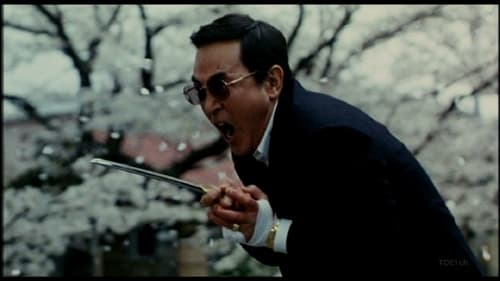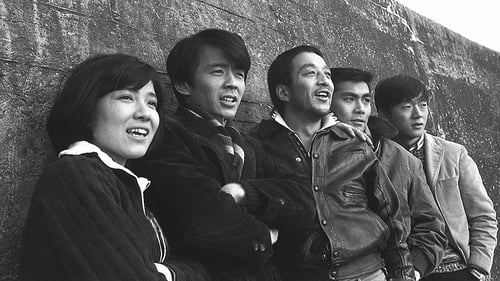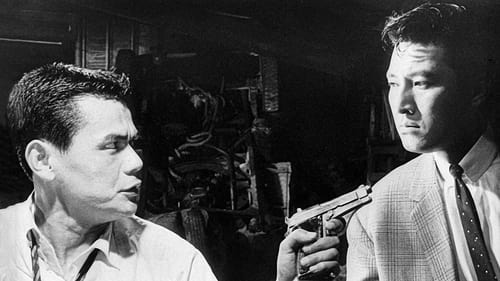Tetsuo Ishidate
Nascimento : 1942-07-31, Yokosuka, Kanagawa Prefecture, Japan
Morte : 2007-06-01

Old man
In the year 20XX, anarchy reigns over Tokyo after a devastating earthquake destroyed the city. Isolated from the rest of the country, the chaos-ridden city is ruled over by an autocratic governor (Izumiya Shigeru) who has forbidden all forms of entertainment including cinema. Timid movie lover Furuta (Wentz Eiji) and mischievous rocker Nitta (Nakao Akiyoshi), two peddling high school boys lost in the city's wasteland, gather forces and lead a youth rebellion against the governor.

Ryosuke Mita
Hiroshi Hamano, a professor at a medical university, is found dead. Going by the results of the autopsy, it appears he committed suicide by jumping off a roof, but going by eyewitness testimony and physical evidence at the scene, Detective Kamei suspects murder. A ticket for a train trip around Japan is found in the professor's pocket. However, nobody then could have known the shocking truth hidden behind the tour the dead man was supposed to attend...

Katakura Kagetsuna
The live of the daimyo Date Masamune

Hondo
After the death of previous Boss, a gang war lasts for more than four years.

Ohyama
Two TV salarymen uphold their duty by taking on a rival talent agency during the late-'80s bubble economy.


An awkward attempt to build a movie around Pink Lady, the name given to a Japanese pop music duo consisting of the very pretty short-haired Mie and the long-haired Kei. Their popularity in Japan lasted from 1976 to 1979 before their attempt to break into the American market with the ill-fated TV show, "Pink Lady and Jeff" (1980), which wound up setting back the cause of J-pop in America by nearly 30 years. Pink Lady they gained a certain amount of attention from the sexy disco-inspired outfits they wore in concert, generally featuring shiny scanty tops, tight hot pants and gold or silver boots, seen to good advantage in some segments of the movie. This musical features the Pink Ladies as circus performers who show kindness toward a captured "monster," a sad, furry being (played by a man in a bulky, over-sized pink acrylic costume) who suffers acts of unusual cruelty by the keeper and ringmaster before the girls escape with the creature in a circus trailer.

Laughter is brought about by a teacher-husband and student-wife couple.

Kikuo Higuchi
If You Were Young: Rage highlights the other side of post-war Japanese prosperity, focusing on the throngs of young people who missed out on the boom. We follow a group of young men that can't seem to get ahead, despite their willingness to try. Then one hits upon a plane - to work together to save for a dump truck and thus become independent contractors and be their own bosses at last. Ultimately life presents obstacles: jail for one, violence at the hands of the police for another and a girlfriend and subsequent children for the third. An early Kinji Fukasaku gem that imports the freewheeling style of the French New Wave and the hip detachment of American noir.

"Young People" is a story about the lives of four brothers and a sister, Sato. After the death of his parents, the older brother, Taro, who works in construction, decides to replace them. The second brother, Jiro, is a truck driver. The third, Saburo, is a student, dreams of a better future for the whole family are connected with him, with his career. Brothers and sisters are fighting to give him a higher education. And, finally, the youngest of the brothers, Suekichi, is also going to enter the university after graduation. The life of the Sato family is complicated. Taro is kind, but limited, not always able to find a common language with his brothers and sister Orie. The girl cannot stand the despotism of her brother, leaves her home and goes to work at the factory. With her departure, everything in the house goes upside down. Suekichi fails her university entrance exams, Orie is forced to return to her family.

Shigeru Nishimura
Drama about the friendship between a lonely laborer (Atsumi) and a young woman (Hoshi) unable to enter college.

Takamura, a poet and sculptor, marries a budding artist named Chieko who dreams of becoming an oil painter. When a series of hardships befall her family, she finds herself unable to confide in her husband, and the pain she carries within begins to weigh heavily on her sanity...

Japanese drama film.

Melodrama based on a hit song of the same title.

Saburo
A young wealthy widow becomes sexually involved with her father-in-law, while harboring a destructive obsession with the family gardener.

Nobuo Oikawa
Japanese youth film.

The Sengoku Era was coming to an end. The monopoly of the ever powerful shogun, Ieyasu Tokugawa, was at a near. Only one man was brave enough to stand in Ieyasu's way - A lone wolf samurai by the name of Kagekatsu Uesugi. Inspired by Uesugi's courage to revolt, a young samurai warrior, Touzou Kuruma decides to join the fight. Their target: the Tamonyama Castle.

This tragic drama shows a young man fettered by Bushido, the way of the Samurai, who tried to escape the chains of his position, but was being forced to die. When the Tokugawa Shogunate ruled the land, Tatsuno castle in Wakisaka Clan's home of Harima held an established custom, the inspection of the arms warehouse. The Government Inspector Okuno Magodayu found a slight bit of dirt on the point of a spear and mentioned it with disdain. Ezaki Shinpachi heard it and started an argument with him. Magodayu then sent a a letter of challenge to him because he felt insulted by a low-ranking underling without a title. As it turned out Magodayu was killed. Since then, Shinpachi and the Okuno family have had continuous revenge duels. The tension mounts as this story builds to an extremely violent climax, when blood must pay for blood if the clan is to survive!

A group of criminals whose diamond heist goes wrong retreat to a WWII era bunker where tensions begin to rise.










